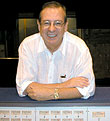
Based in southern California, Barry
Rudolph has been a recording engineer for more than three decades and
has worked with a "who's who" of top artists. He also is a widely published
audio journalist whose work has appeared in numerous industry publications.
|
|
Nobody Will Ever Hear That!
Work Ethos
Another facet of Working At Success as a recording engineer is the development of your work ethos. These are the distinguishing characteristics and habits that separate you from other recording engineers.
For a recording engineer, a generally affable and socialized personality and the ability to get good sounds might be first impressions but trustworthiness and integrity are as important--after all the producer, artist and record company have to believe in you and the quality of your work. Within the constraints of time and budget, has all the engineering been well executed without compromise?
Popular control room expressions like: "we'll fix in the mix" or "close enough for Rock and Roll" carry little real meaning or importance anymore. However, the expression "nobody will ever hear that" is a veiled warning. I've heard producers say something like this when I solo a single vocal track (amongst others) and then play devil's advocate by questioning the pitch center. I'm not challenging the producer's ability to hear correct pitch or his decision to allow a few bum notes (we'll fix it in the mix and it's close enough for Rock and Roll) but I do fault the rationale behind the statement: nobody will ever hear that.
Even though consumer stereo systems are not equipped with solo buttons (not yet anyway) and I'm as hearing impaired as any other recording studio veteran; if I can hear it, somebody else can and will. My work ethos tells me to speak up about it.
Tales From The Vault
When I was a staff assistant engineer at a famous L.A. studio, the first engineer learned the "nobody will ever hear that" lesson the hard way.
I'll call this engineer Louie. He had a reputation for engineering and mixing hit Pop records for many big stars--his producer clientele trusted him with the sound and mix. Louie was called on to record and mix a 'hit' single for very hot artist at the time. There was a big priority to get this record done quickly so it could be sent to the major radio stations around the country in anticipation of an upcoming album and tour. In fact, the number one P1 station in L.A. promised to play it as soon as it was mixed!
I assisted Louie through tracking and mixing and for this song; the producer rented a certain 'modified' Fender Rhoades electric piano known for its super sound and classic stereo tremolo effect. This effect causes the sound to move, back and forth, left and right over the keyboard's two built-in speakers.
The song called for the intro and first verse to be the stereo Rhoades piano and lead vocal only and, at the first chorus, the rest of the band would join in for a big dynamic lift.
During the recording session at my station in the back of the control room along side the multitrack tape deck, I immediately noticed the Rhoades piano had a very wide sound across the left and right monitor speakers--actually too wide--it seemed to be coming from outside the speakers.
I quietly asked Louie if he had checked the phase--the polarity of the left and right Fender Rhoades channels--did they add together in mono when you summed them (L+R) or do they cancel out producing little or no sound? I had found that some Fender Rhoades rentals came miswired--the polarity flipped and I'd flip it again on the console to get back mono compatibility. There also could be a 'flipped' XLR mic cable.
Louie shouted at me telling me to mind my own business and that whatever I was talking about, "nobody will ever hear that." He, as usual, ended that imperious outburst with one of his 'nom de insult du jour' he always had ready for me.
Louie and I finished the record and the record company mastered it and had a 1,000 singles quickly pressed up to service all the P1 stations and independent promoters around the country. A few copies were hand-delivered to the local station that promised to play it ASAP. Just to build excitement all around L.A., the station phoned everyone at the record label and said they'd play it at 9am during drive time on the very next Monday.
On that Monday and at 9am Louie was in his car on his way to the studio when the station announced the song was going to play right after the next commercial. This was L.A.'s biggest AM Pop station and, since everyone (by this time) stopped making separate mono mixes for AM radio, the engineers simply summed the left and right channels of stereo records for broadcast in mono.
The song came on the radio and the intro and first verse were now a capella vocal--no Rhoades piano accompaniment whatsoever! Louie told me he almost drove off the road but then realized that his whole career was on the line here. While the song played, he hurried to the studio to remix and call the pressing plant to stop the presses.
Prior to the 'on-the-air' radio station debut "nobody ever heard that" including Louie, the mastering engineer, the producer, the artist, and the record label. |
